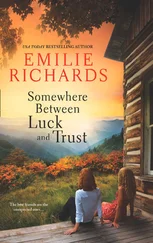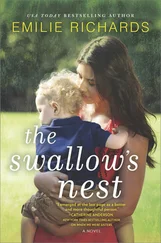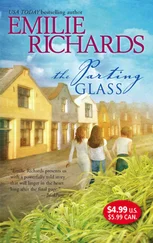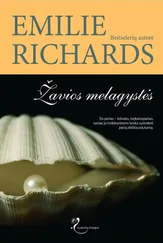“I’d like you to stop saying that. You need to stay here to get well.”
“You can catch Callie before she goes to bed. Please go home and read her a story for me.”
He was silent a moment. “All right. But I’ll let her read to me. She needs practice.”
It was an old argument. Callie had a form of dyslexia that made reading a struggle. Bard believed if the little girl just read out loud enough, her disabilities would disappear. No matter how much she hated it or how much it upset her.
“Will you read to her instead, please?” Julia asked. “She can practice reading when everything else is back to normal.”
“You want me to spend time with her, but you want to tell me exactly how to spend it.”
“If you spent more time with her, I wouldn’t have to tell you.”
When he spoke, he was standing directly in front of her. She hadn’t even heard him move. “If it will make you feel better, I’ll read to her. But will you stop fighting everything and everyone and concentrate on seeing again?”
She didn’t repeat that all the concentration in the world wasn’t going to bring back her eyesight. She recognized a compromise when she heard one. “I’ll do whatever it takes,” she promised.
“That’s my girl.” He bent and kissed her, not on the cheek but full on the lips.
“I’ll see you tomorrow?”
“That would be wonderful.” His voice was husky. “I hope you will see me tomorrow.”
“Me, too.”
“I’m flying down to Richmond early in the morning, and I won’t be by until after dinner. Sleep well.”
That was a promise she couldn’t make. “You, too.”
He closed the door gently enough, but moments later it still resounded. She was left with an assortment of feelings.
She had never dealt well with her own emotions. Only rarely had she understood what fed the creative well inside her or sealed it completely. She had found it best not to tamper. Painting or drawing, even sculpting—something she’d only done infrequently—had become her outlet. Perhaps she didn’t understand anything better when she’d finished, but she felt better. And that was good enough.
Now a desire to sketch seized her with a force that almost took away her breath. She got to her feet and felt her way around the room until she came to the desk. She slid her fingers underneath, feeling for a drawer. She was rewarded with what felt like a wooden knob, and when she grasped it, she felt the drawer sliding toward her. When it was open, she poked her fingers inside and felt for paper or a pen, but the only thing residing there was what felt like a slender telephone book, despite the fact that her room had no telephone.
To prevent theft, Bard had taken her purse. At the time she hadn’t thought that he was also taking pens and memo pad, her only means of drawing. Why would she have? How odd to think that a blind woman would want to draw something she couldn’t see.
Yet she did. With such an intensity, such a hunger, that she felt, for a moment, that she might starve if she couldn’t.
Before she could think what to do, Karen knocked and entered. “I saw your husband leave. Will you need help getting ready for bed, Mrs. Warwick?”
She wanted to weep with relief. “Karen, this probably sounds ridiculous. But I’m an artist, and even though I can’t see, I need to draw. I don’t need anything fancy. Just a notepad, if you have one. A pencil or two, even a pen. Would that be too much trouble?”
Karen didn’t answer for a moment, just long enough to let Julia know she wasn’t thinking about where she might find supplies.
“Mrs. Warwick, the thing is, Dr. Jeffers has forbidden it. He ordered the nursing staff not to provide you with art supplies.”
Julia still didn’t understand. “What possible reason could he have for that? Is he afraid I’ll slit my throat with a pencil?”
“I think…I think he believes it’s an escape from reality. That he wants you to face your problems directly.”
Julia drew a startled breath.
Karen hurried on. “Do you want me to call him at home? I could tell him what you’ve asked and see if I can get permission. He might want to come and talk to you about it himself.”
Julia slashed her hand through the air to cut her off. She knew what Dr. Jeffers would say. He was locked firmly in the psychiatric past, when psychoanalysis was the only therapy worth mentioning.
“I’m so sorry,” Karen said. “I don’t agree with him. But if I helped you…”
“I’ll get myself ready for bed.”
“I really am sorry.”
Julia didn’t trust herself to answer.
“I’ll just scatter the wood. The fire’s almost out anyway.”
Julia stood stiffly and waited until Karen closed the door. Anger was now a boiling cauldron inside her. Rarely had she felt so unfairly treated. At this, the most frightening moment of her life, she was locked away among strangers she couldn’t see, the prisoner of outdated therapies and psychiatric whims.
She had never been a rebel. In all areas of her life, her choices were usually fueled by concern for others. Even as an artist, she had never rocked the boat. She painted traditional portraits and landscapes. At William and Mary she had been the despair of art professors who had praised her talent and urged her to break free of convention.
She wanted to break free now. She had followed all the rules, and look what had happened to her. Her own body had betrayed her.
She took a deep breath to calm herself, but it was like a gust of wind fueling glowing embers. From the other side of the room she heard a faint pop from the fireplace. She wondered what was left of the fire Karen had made. The nurse had scattered the logs. Nothing more than kindling, she’d called them. There might not be anything now except coals.
Or there might be a stick or two, partially burned and black as charcoal. She abandoned the idea immediately, but it formed again, a foolish, dangerous rebellion that could burn down the clinic. At the very least she would never have another fire in her room, no matter how cold the weather.
She made her way to the fireplace and placed her palms against the opening. It was glass, as she’d expected from the noises Karen had made opening and closing it. She found the handles to pull it apart and was rewarded with a screech as the panels parted. She knelt on the hearth and held her palms against the opening. The heat was minimal. The fire must have been small, just as Karen had said.
She knew she might get singed, but she didn’t care. She lowered her hands and felt along the seam between the tile hearth and brick lining. At first she was unsuccessful, but as she inched forward, she felt a piece of wood that was cool to the touch. She investigated it carefully with her fingertips. It seemed to be about two inches in diameter, more kindling than log. She gripped it in her right hand and inched her left along its length. It grew hotter as she progressed, until she drew scorched fingertips back in alarm.
She guessed that the tip was still glowing. She lifted the stick higher and gently ground the tip against the floor of the fireplace for a moment. Then she inched her hand along its length again. She repeated the ritual several times until she was finally satisfied. She lifted it higher and waved it in front of her face. The kindling was barely smoking now, not actively alight, and most likely well on its way to becoming ash.
What did it matter if she was imagining what this makeshift charcoal pencil could do? She couldn’t see the result. It was the motion that mattered, the translation of the visions in her mind.
She stood and realized she was trembling with excitement. How much of it was the thrill of the mutineer and how much the thrill of the artist? She didn’t know or care. She was about to transform an unthinkable situation.
Читать дальше












